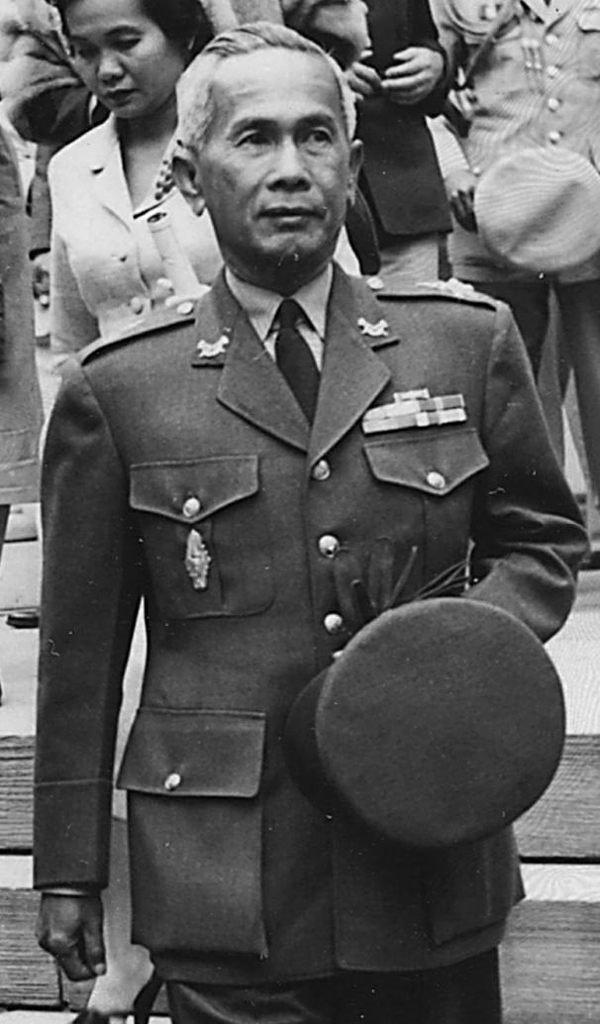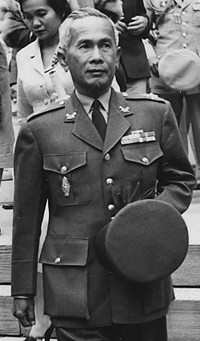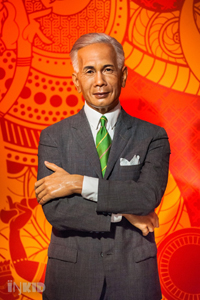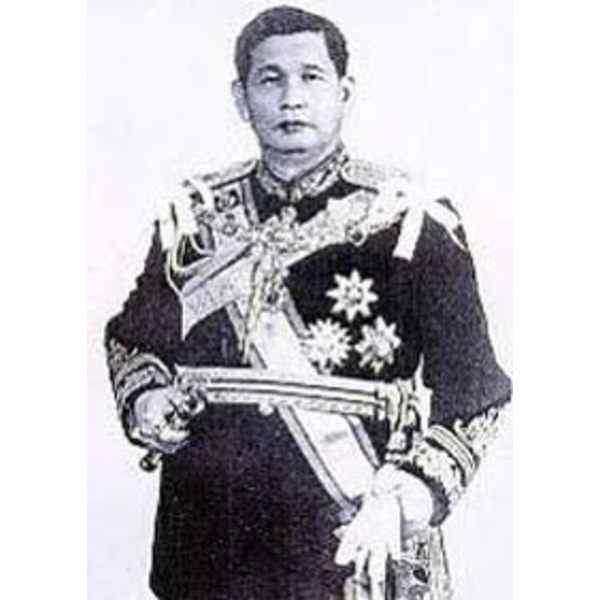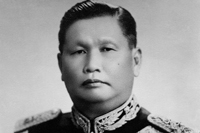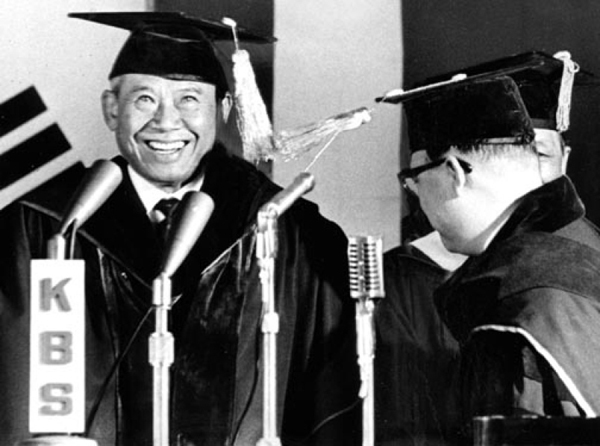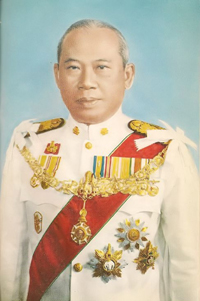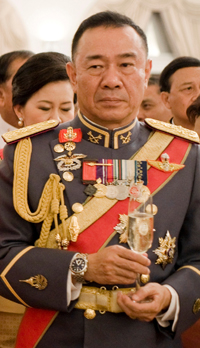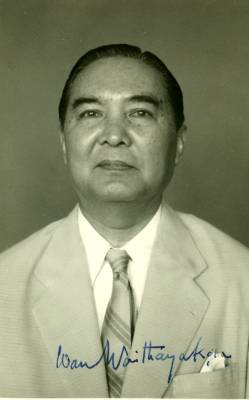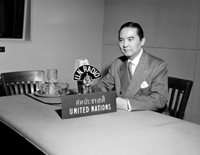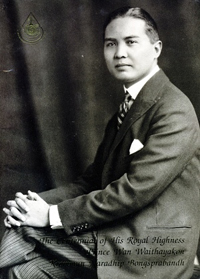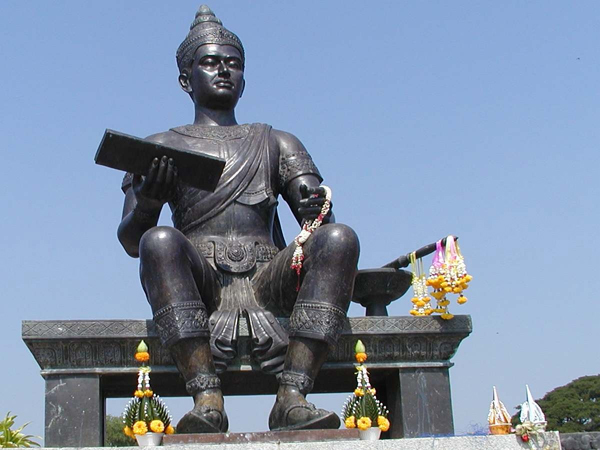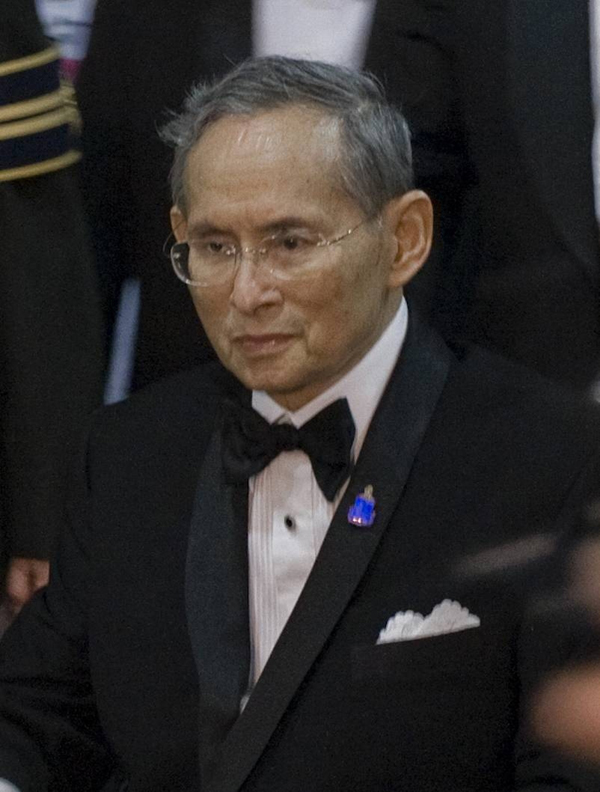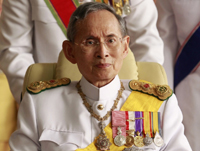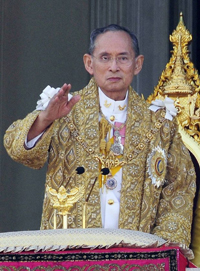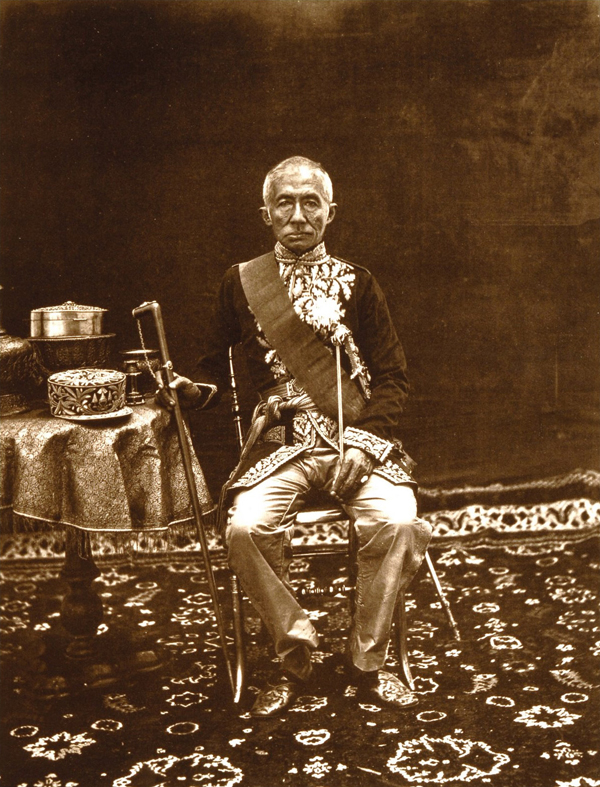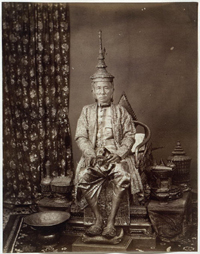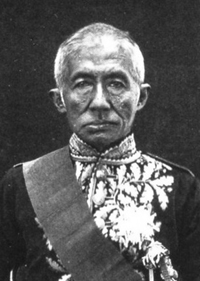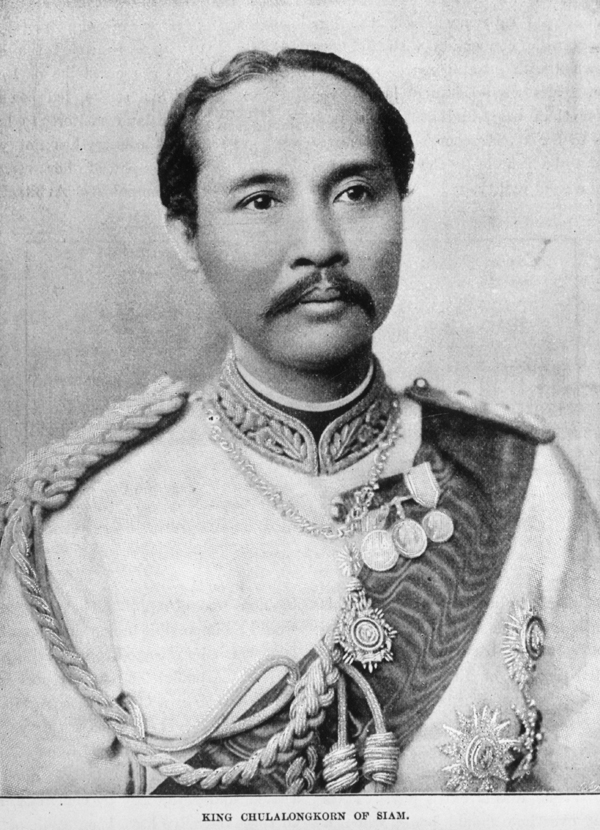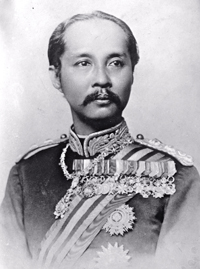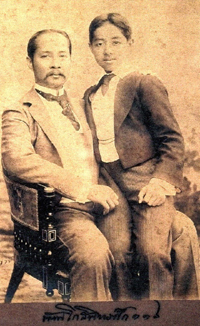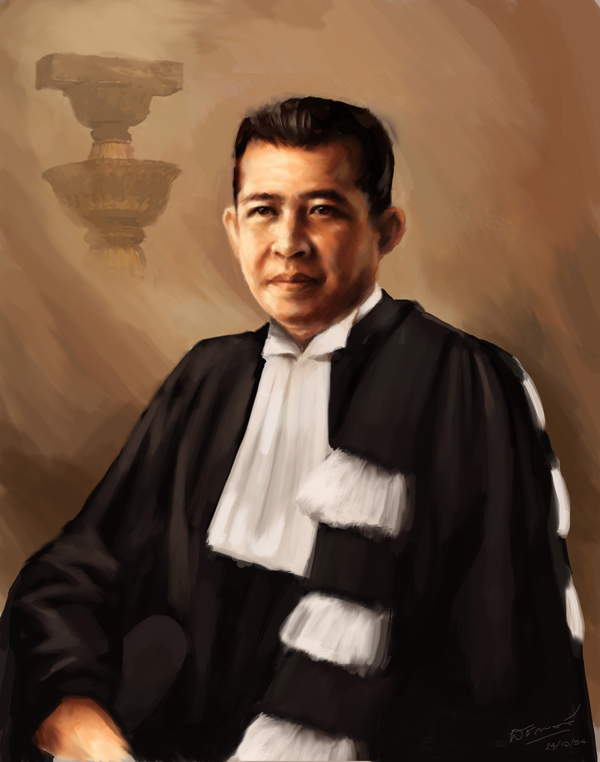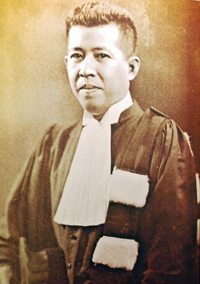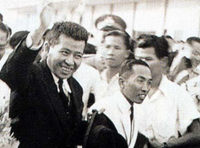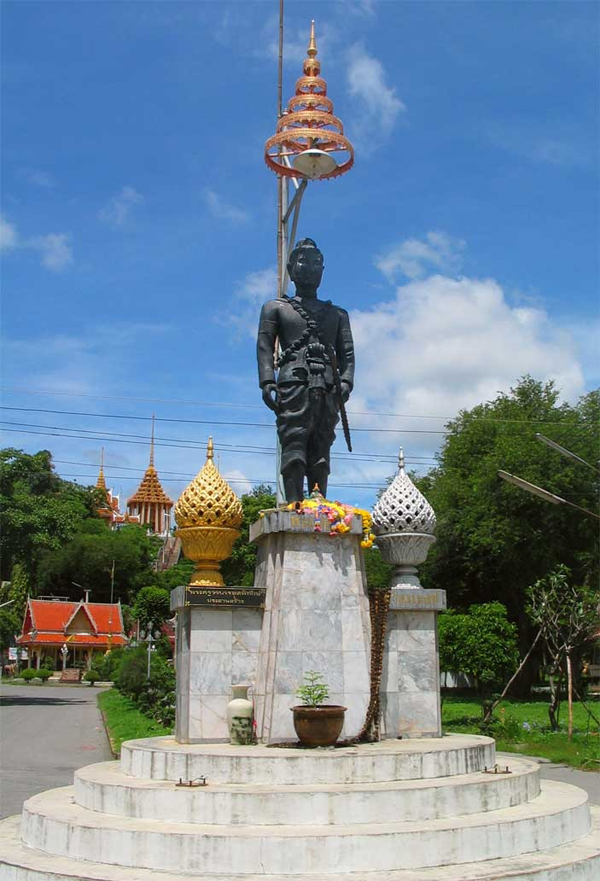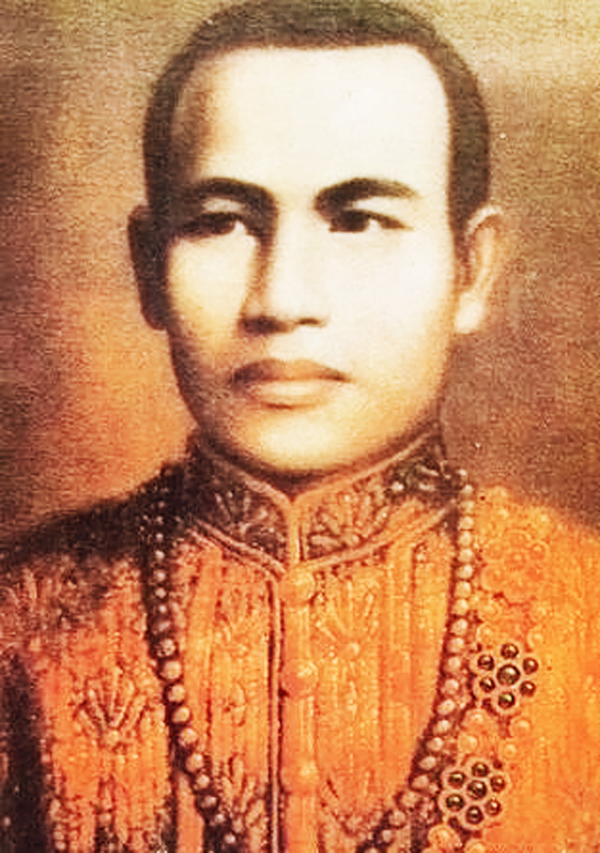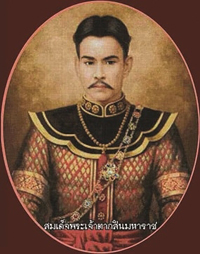History
Military Leaders
Plaek Phibunsongkhram
Field of Interest: Military and Political Leader
Known For: 3rd Prime Minister of Thailand (December 16, 1938 – August 1, 1944) (April 8, 1948 – September 16, 1957)Further progress toward modernization was accomplished in by three outstanding premiers: Phibul Songgram (1897–1964), Pridi Banomyong (1900–83), and Sarit Thanarat (1900–63).Field Marshal Plaek Phibunsongkhram contemporarily known as Luang Pibulsonggram, often as Phibunsongkhram (Pibul Songgram) or simply Phibun (Pibul) in the West, was Prime Minister and virtual military dictator of Thailand from 1938 to 1944 and 1948 to 1957.
Country: Thailand
Date of Birth: 14 July 1897
Place of Birth: Nonthaburi, Nonthaburi, Siam
Date of Death: 11 June 1964
Please of Death: Sagamihara, Kanagawa, Japan
Spouse: Thanphuying or Lady La-aide Bhandhukravi
Known For: 3rd Prime Minister of Thailand (December 16, 1938 – August 1, 1944) (April 8, 1948 – September 16, 1957)Further progress toward modernization was accomplished in by three outstanding premiers: Phibul Songgram (1897–1964), Pridi Banomyong (1900–83), and Sarit Thanarat (1900–63).Field Marshal Plaek Phibunsongkhram contemporarily known as Luang Pibulsonggram, often as Phibunsongkhram (Pibul Songgram) or simply Phibun (Pibul) in the West, was Prime Minister and virtual military dictator of Thailand from 1938 to 1944 and 1948 to 1957.
Country: Thailand
Date of Birth: 14 July 1897
Place of Birth: Nonthaburi, Nonthaburi, Siam
Date of Death: 11 June 1964
Please of Death: Sagamihara, Kanagawa, Japan
Spouse: Thanphuying or Lady La-aide Bhandhukravi
Sarit Thanarat
Field of Interest: Military and Political Leader
Known For: 11thPrime Minister of Thailand (October 20, 1958 – December 8, 1963)Further progress toward modernization was accomplished in by three outstanding premiers: Phibul Songgram (1897–1964), Pridi Banomyong (1900–83), and Sarit Thanarat (1900–63).Field Marshal Sarit Thanarat was a Thai career soldier who staged a coup in 1957, thereafter serving as Thailand's Prime Minister until his death in 1963. He was born in Bangkok, but grew up in his mother's home town in Lao-speaking northeastern Thailand and considered himself an Isan. His father, Major Luang Ruangdetanan (birth name Thongdi Thanarat), was a career army officer best known for his translations into Thai of Cambodian literature. During his years as prime minister Sarit was a patron of his cousin, the Lao strongman General Phoumi Nosavan, against the communist Pathet Lao guerrillas in the neighboring Kingdom of Laos.
Country: Thailand
Date of Birth: 16 June 1908
Place of Birth: Bangkok, Siam
Date of Death: 8 December 1963
Please of Death: Bangkok, Thailand
Spouse: Nuanchan Thanarat (two children), Chawee (two children), Praima (two children)Vichitra Thanarat (no children, but adopted nephew and gave the Thanarat last name)
Known For: 11thPrime Minister of Thailand (October 20, 1958 – December 8, 1963)Further progress toward modernization was accomplished in by three outstanding premiers: Phibul Songgram (1897–1964), Pridi Banomyong (1900–83), and Sarit Thanarat (1900–63).Field Marshal Sarit Thanarat was a Thai career soldier who staged a coup in 1957, thereafter serving as Thailand's Prime Minister until his death in 1963. He was born in Bangkok, but grew up in his mother's home town in Lao-speaking northeastern Thailand and considered himself an Isan. His father, Major Luang Ruangdetanan (birth name Thongdi Thanarat), was a career army officer best known for his translations into Thai of Cambodian literature. During his years as prime minister Sarit was a patron of his cousin, the Lao strongman General Phoumi Nosavan, against the communist Pathet Lao guerrillas in the neighboring Kingdom of Laos.
Country: Thailand
Date of Birth: 16 June 1908
Place of Birth: Bangkok, Siam
Date of Death: 8 December 1963
Please of Death: Bangkok, Thailand
Spouse: Nuanchan Thanarat (two children), Chawee (two children), Praima (two children)Vichitra Thanarat (no children, but adopted nephew and gave the Thanarat last name)
Thanom Kittikachorn
Field of Interest: Military and Political Leader
Known For: 10th Prime Minister of Thailand (December 9, 1963 – October 14, 1973) (January 1, 1958 – October 20, 1958)Marshal Thanom Kittikachorn (b.1911) was leader of Thailand from 1963 until October 1973, when political protests compelled his resignation as prime minister.Field Marshal Thanom Kittikachorn was a military dictator of Thailand. A staunch anti-Communist, Thanom oversaw a decade of military rule in Thailand from 1963 to 1973, until public protests which exploded into violence forced him to step down. His return from exile in 1976 sparked protests which led to a massacre of demonstrators, followed by a military coup.
Country: Thailand
Date of Birth: 11 August 1911
Place of Birth: Tak, Tak, Siam
Date of Death: 16 June 2004
Please of Death: Bangkok, Thailand
Spouse: Jongkol Kittikachorn
Known For: 10th Prime Minister of Thailand (December 9, 1963 – October 14, 1973) (January 1, 1958 – October 20, 1958)Marshal Thanom Kittikachorn (b.1911) was leader of Thailand from 1963 until October 1973, when political protests compelled his resignation as prime minister.Field Marshal Thanom Kittikachorn was a military dictator of Thailand. A staunch anti-Communist, Thanom oversaw a decade of military rule in Thailand from 1963 to 1973, until public protests which exploded into violence forced him to step down. His return from exile in 1976 sparked protests which led to a massacre of demonstrators, followed by a military coup.
Country: Thailand
Date of Birth: 11 August 1911
Place of Birth: Tak, Tak, Siam
Date of Death: 16 June 2004
Please of Death: Bangkok, Thailand
Spouse: Jongkol Kittikachorn
Political Leaders
His Royal Highness Prince Vanna Vaidhayakara, the Prince Naradhip Bhongseprabhan
Field of Interest: Political Leader
Known For: President of the United Nations General Assembly (1956–1957)Prince Wan Waithayakon (1891–1976), foreign minister and Thailand's representative to the UN, played a major role in diplomacy following World War II.Wan Waithayakon (full title: His Royal Highness Prince Vanna Vaidhayakara, the Prince Naradhip Bhongseprabhan), known in the West as Wan Waithayakon was a Thai diplomat. He was elected President of the Eleventh Session of the United Nations General Assembly, while serving as Thailand's Permanent Representative to the United Nations. He was a grandson of King Mongkut.
Country: Thailand
Date of Birth: ca. 1891
Place of Birth: Unknown
Date of Death: ca. 1976
Please of Death: Unknown
Known For: President of the United Nations General Assembly (1956–1957)Prince Wan Waithayakon (1891–1976), foreign minister and Thailand's representative to the UN, played a major role in diplomacy following World War II.Wan Waithayakon (full title: His Royal Highness Prince Vanna Vaidhayakara, the Prince Naradhip Bhongseprabhan), known in the West as Wan Waithayakon was a Thai diplomat. He was elected President of the Eleventh Session of the United Nations General Assembly, while serving as Thailand's Permanent Representative to the United Nations. He was a grandson of King Mongkut.
Country: Thailand
Date of Birth: ca. 1891
Place of Birth: Unknown
Date of Death: ca. 1976
Please of Death: Unknown
Pho Khun Ram Khamhaeng
Field of Interest: Ruler
Known For: Third king of the Phra Ruang dynasty, credited with the creation of the Thai alphabetMany ancient Thai kings enjoy legendary reputations. Rama Khamheng (the Great), a 13th-century monarch, is traditionally regarded as the inventor of the Thai alphabet; Rama Tibodi I in the 14th century promulgated the first-known Thai laws; Trailok instituted lasting governmental reforms in the 15th century; and Phya Tak in the 18th century rebuilt a war-defeated Thailand.King Ram Khamhaeng was the third king of the Phra Ruang dynasty, ruling the Sukhothai Kingdom (a forerunner of the modern kingdom of Thailand) from 1279–1298, during its most prosperous era. He is credited with the creation of the Thai alphabet and the firm establishment of Theravada Buddhism as the state religion of the kingdom. Recent scholarship has cast doubt on his role, however, noting that much of the information relating to his rule may have been fabricated in the 19th century in order to legitimize the Siamese state in the face of colonial threats.
Country: Thailand
Date of Birth: ca. 1237 1247
Place of Birth: Unknown
Date of Death: ca. 1298 1317
Please of Death: Unknown
Known For: Third king of the Phra Ruang dynasty, credited with the creation of the Thai alphabetMany ancient Thai kings enjoy legendary reputations. Rama Khamheng (the Great), a 13th-century monarch, is traditionally regarded as the inventor of the Thai alphabet; Rama Tibodi I in the 14th century promulgated the first-known Thai laws; Trailok instituted lasting governmental reforms in the 15th century; and Phya Tak in the 18th century rebuilt a war-defeated Thailand.King Ram Khamhaeng was the third king of the Phra Ruang dynasty, ruling the Sukhothai Kingdom (a forerunner of the modern kingdom of Thailand) from 1279–1298, during its most prosperous era. He is credited with the creation of the Thai alphabet and the firm establishment of Theravada Buddhism as the state religion of the kingdom. Recent scholarship has cast doubt on his role, however, noting that much of the information relating to his rule may have been fabricated in the 19th century in order to legitimize the Siamese state in the face of colonial threats.
Country: Thailand
Date of Birth: ca. 1237 1247
Place of Birth: Unknown
Date of Death: ca. 1298 1317
Please of Death: Unknown
Phra Bat Somdet Phra Paraminthra Maha Bhumibol Adulyadej Mahitalathibet Ramathibodi Chakkrinaruebodin Sayamminthrathirat Borommanatthabophit
Field of Interest: Ruler
Known For: Ninth monarch of the Chakri DynastyKing Bhumibol Adulyadej (b.US, 1927) ascended the throne in 1946.Bhumibol Adulyadej is the King of Thailand. He is also known as Rama IX, as he is the ninth monarch of the Chakri Dynasty. Having reigned since 9 June 1946, he is the world's longest-serving current head of state and the longest-reigning monarch in Thai history, serving for 68 years, 331 days. King Bhumibol is respected and revered by most Thais. In 1957, the overthrow of his then government was justified with allegations of lèse majesté, which is offence against the dignity of the monarch, punishable under Thai law. Although Bhumibol did invite public criticism in a 2005 speech, the lèse majesté laws have not been revoked by the Thai parliament. Forbes estimated Bhumibol's fortune—including property and investments managed by the Crown Property Bureau (CPB), a unique body that is neither private nor government-owned—to be US$30 billion in 2010, and he was the leader of the magazine's list of "The World's Richest Royals" from 2008 to 2013. In May 2014, Bhumibol's wealth was once again listed as US$30 billion. Officially the assets managed by the CPB are owned by the crown as an institution, not Bhumibol Adulyadej as an individual.
Country: Thailand
Date of Birth: 5 December 1927
Place of Birth: Cambridge, Massachusetts, U.S.A.
Spouse: Sirikit Kitiyakara
Known For: Ninth monarch of the Chakri DynastyKing Bhumibol Adulyadej (b.US, 1927) ascended the throne in 1946.Bhumibol Adulyadej is the King of Thailand. He is also known as Rama IX, as he is the ninth monarch of the Chakri Dynasty. Having reigned since 9 June 1946, he is the world's longest-serving current head of state and the longest-reigning monarch in Thai history, serving for 68 years, 331 days. King Bhumibol is respected and revered by most Thais. In 1957, the overthrow of his then government was justified with allegations of lèse majesté, which is offence against the dignity of the monarch, punishable under Thai law. Although Bhumibol did invite public criticism in a 2005 speech, the lèse majesté laws have not been revoked by the Thai parliament. Forbes estimated Bhumibol's fortune—including property and investments managed by the Crown Property Bureau (CPB), a unique body that is neither private nor government-owned—to be US$30 billion in 2010, and he was the leader of the magazine's list of "The World's Richest Royals" from 2008 to 2013. In May 2014, Bhumibol's wealth was once again listed as US$30 billion. Officially the assets managed by the CPB are owned by the crown as an institution, not Bhumibol Adulyadej as an individual.
Country: Thailand
Date of Birth: 5 December 1927
Place of Birth: Cambridge, Massachusetts, U.S.A.
Spouse: Sirikit Kitiyakara
Phra Bat Somdet Phra Poramenthra Maha Mongkut Phra Chom Klao Chao Yu Hua
Field of Interest: Ruler
Known For: Fourth monarch of Siam (Thailand)Two great monarchs, Mongkut (r.1851–68) and his son Chulalongkorn (r.1868–1910), became famous for introducing Thailand to the modern world. They are, respectively, the king and his young successor in Margaret Landon's Anna and the King of Siam.Phra Bat Somdet Phra Poramenthra Maha Mongkut Phra Chom Klao Chao Yu Hua (Thai:พระบาทสมเด็จพระปรเมนทรมหามงกุฎ พระจอมเกล้าเจ้าอยู่หัว), or Rama IV, known in English-speaking countries as King Mongkut was the fourth monarch of Siam (Thailand) under the House of Chakri, ruling from 1851 to 1868. He was one of the most revered monarchs of the country. Outside of Thailand, he is best known as the King in the 1951 play and 1956 film The King and I, based on the 1946 film Anna and the King of Siam – in turn based on a 1944 novel by an American missionary about Anna Leonowens' years at his court, from 1862 to 1867. During his reign, the pressure of Western expansionism was felt for the first time in Siam. Mongkut embraced Western innovations and initiated the modernization of Siam, both in technology and culture—earning him the nickname "The Father of Science and Technology" in Siam. Mongkut was also known for his appointing his brother, Prince Chutamani, as Second King, crowned in 1851 as King Pinklao. Mongkut himself assured the country that Pinklao should be respected with equal honor to himself (as King Naresuan had done with his brother Ekathotsarot in 1583.) Mongkut's reign was also the time when the power of the House of Bunnag reached its zenith and became the most powerful noble family of Siam.
Country: Thailand
Date of Birth: 18 October 1804
Place of Birth: Thonburi Palace, Bangkok Yai, Thonburi, Kingdom of Siam
Date of Death: 1 October 1868
Please of Death: Grand Palace, Phra Nakhon, Phra Nakhon, Kingdom of Siam
Spouse: Queen Somanass Waddhanawathy (1851) Queen Debsirindra (1851–1861) Princess Pannarai (1861–1869)
Known For: Fourth monarch of Siam (Thailand)Two great monarchs, Mongkut (r.1851–68) and his son Chulalongkorn (r.1868–1910), became famous for introducing Thailand to the modern world. They are, respectively, the king and his young successor in Margaret Landon's Anna and the King of Siam.Phra Bat Somdet Phra Poramenthra Maha Mongkut Phra Chom Klao Chao Yu Hua (Thai:พระบาทสมเด็จพระปรเมนทรมหามงกุฎ พระจอมเกล้าเจ้าอยู่หัว), or Rama IV, known in English-speaking countries as King Mongkut was the fourth monarch of Siam (Thailand) under the House of Chakri, ruling from 1851 to 1868. He was one of the most revered monarchs of the country. Outside of Thailand, he is best known as the King in the 1951 play and 1956 film The King and I, based on the 1946 film Anna and the King of Siam – in turn based on a 1944 novel by an American missionary about Anna Leonowens' years at his court, from 1862 to 1867. During his reign, the pressure of Western expansionism was felt for the first time in Siam. Mongkut embraced Western innovations and initiated the modernization of Siam, both in technology and culture—earning him the nickname "The Father of Science and Technology" in Siam. Mongkut was also known for his appointing his brother, Prince Chutamani, as Second King, crowned in 1851 as King Pinklao. Mongkut himself assured the country that Pinklao should be respected with equal honor to himself (as King Naresuan had done with his brother Ekathotsarot in 1583.) Mongkut's reign was also the time when the power of the House of Bunnag reached its zenith and became the most powerful noble family of Siam.
Country: Thailand
Date of Birth: 18 October 1804
Place of Birth: Thonburi Palace, Bangkok Yai, Thonburi, Kingdom of Siam
Date of Death: 1 October 1868
Please of Death: Grand Palace, Phra Nakhon, Phra Nakhon, Kingdom of Siam
Spouse: Queen Somanass Waddhanawathy (1851) Queen Debsirindra (1851–1861) Princess Pannarai (1861–1869)
Phra Bat Somdet Phra Poraminthra Maha Chulalongkorn Phra Chunla Chom Klao Chao Yu Hua
Field of Interest: Ruler
Known For: Fifth monarch of SiamTwo great monarchs, Mongkut (r.1851–68) and his son Chulalongkorn (r.1868–1910), became famous for introducing Thailand to the modern world. They are, respectively, the king and his young successor in Margaret Landon's Anna and the King of Siam.Phra Bat Somdet Phra Poraminthra Maha Chulalongkorn Phra Chunla Chom Klao Chao Yu Hua (Thai:พระบาทสมเด็จพระปรมินทรมหาจุฬาลงกรณ์ พระจุลจอมเกล้าเจ้าอยู่หัว), or Rama V was the fifth monarch of Siam under the House of Chakri. He was known to the Siamese of his time as Phra Phuttha Chao Luang (พระพุทธเจ้าหลวง –The Royal Buddha). He is considered one of the greatest kings of Siam. His reign was characterized by the modernization of Siam, immense government and social reforms, and territorial cessions to the British Empire and French Indochina. As Siam was threatened by Western expansionism, Chulalongkorn, through his policies and acts, managed to save Siam from being colonized.[1] All his reforms were dedicated to ensuring Siam’s survival in the midst of Western colonialism, so that Chulalongkorn earned the epithet Phra Piya Maharat (พระปิยมหาราช –The Great Beloved King).
Country: Thailand
Date of Birth: 20 September 1853
Place of Birth: Grand Palace, Bangkok
Date of Death: 23 October 1910
Please of Death: Amphorn Sathan Royal Mansion
Spouse: Sunandha Kumariratana Sukumalmarsri Savang Vadhana Saovabha Bongsri Dara Rasmi and 91 other consorts and concubines (96 in total)
Known For: Fifth monarch of SiamTwo great monarchs, Mongkut (r.1851–68) and his son Chulalongkorn (r.1868–1910), became famous for introducing Thailand to the modern world. They are, respectively, the king and his young successor in Margaret Landon's Anna and the King of Siam.Phra Bat Somdet Phra Poraminthra Maha Chulalongkorn Phra Chunla Chom Klao Chao Yu Hua (Thai:พระบาทสมเด็จพระปรมินทรมหาจุฬาลงกรณ์ พระจุลจอมเกล้าเจ้าอยู่หัว), or Rama V was the fifth monarch of Siam under the House of Chakri. He was known to the Siamese of his time as Phra Phuttha Chao Luang (พระพุทธเจ้าหลวง –The Royal Buddha). He is considered one of the greatest kings of Siam. His reign was characterized by the modernization of Siam, immense government and social reforms, and territorial cessions to the British Empire and French Indochina. As Siam was threatened by Western expansionism, Chulalongkorn, through his policies and acts, managed to save Siam from being colonized.[1] All his reforms were dedicated to ensuring Siam’s survival in the midst of Western colonialism, so that Chulalongkorn earned the epithet Phra Piya Maharat (พระปิยมหาราช –The Great Beloved King).
Country: Thailand
Date of Birth: 20 September 1853
Place of Birth: Grand Palace, Bangkok
Date of Death: 23 October 1910
Please of Death: Amphorn Sathan Royal Mansion
Spouse: Sunandha Kumariratana Sukumalmarsri Savang Vadhana Saovabha Bongsri Dara Rasmi and 91 other consorts and concubines (96 in total)
Pridi Banomyong
Field of Interest: Political Leader
Known For: 7th Prime Minister of Thailand (March 24, 1946 – August 23, 1946)Further progress toward modernization was accomplished in by three outstanding premiers: Phibul Songgram (1897–1964), Pridi Banomyong (1900–83), and Sarit Thanarat (1900–63).Pridi Banomyong was a Thai politician. He was a Prime Minister and senior statesman of Thailand, and was named one of the world's great personalities of the 20th century by UNESCO in 2000.
Country: Thailand
Date of Birth: 11 May 1900
Place of Birth: Ayutthaya, Ayutthaya, Siam
Date of Death: 2 May 1983
Please of Death: Paris, France
Spouse: Poonsuk Banomyong
Known For: 7th Prime Minister of Thailand (March 24, 1946 – August 23, 1946)Further progress toward modernization was accomplished in by three outstanding premiers: Phibul Songgram (1897–1964), Pridi Banomyong (1900–83), and Sarit Thanarat (1900–63).Pridi Banomyong was a Thai politician. He was a Prime Minister and senior statesman of Thailand, and was named one of the world's great personalities of the 20th century by UNESCO in 2000.
Country: Thailand
Date of Birth: 11 May 1900
Place of Birth: Ayutthaya, Ayutthaya, Siam
Date of Death: 2 May 1983
Please of Death: Paris, France
Spouse: Poonsuk Banomyong
Ramathibodi I
Field of Interest: Ruler
Known For: First king of the kingdom Ayutthaya (now part of Thailand)Many ancient Thai kings enjoy legendary reputations. Rama Khamheng (the Great), a 13th-century monarch, is traditionally regarded as the inventor of the Thai alphabet; Rama Tibodi I in the 14th century promulgated the first-known Thai laws; Trailok instituted lasting governmental reforms in the 15th century; and Phya Tak in the 18th century rebuilt a war-defeated Thailand.U-thong (Thai:อู่ทอง) or Ramathibodi I (Thai:รามาธิบดีที่1) was the first king of the kingdom Ayutthaya (now part of Thailand), reigning from 1351 to 1369. He was known as Prince U Thong (meaning "source of gold") before he ascended to the throne on March 4, 1351. A native of Chiang Saen (now in Chiang Rai Province) he claimed descent from Khun Borom and propagated Theravada Buddhism as the state religion. Ramathibodi I's position was likely secured by political marriage and family ties. He was married to a daughter of the ruling family of the Suphanburi Kingdom, and may have also married into an alliance with the rulers of Lavo Kingdom (also known as Lopburi), it was likely the king of Lavo that he was initially chosen to succeed. He appointed both his brother-in-law and son to positions of leadership in Suphanburi and Lavo, respectively, and established his own capital in the new city of Ayutthaya. King Ramathabodi's reign bound together the Khmer rulers of Lavo, the Tai in the west, and the Chinese, Javanese, Bugis and Acehnese merchants who inhabited the coastal areas. According to a better-known source, a seventeenth-century account by Dutchman Jeremias Van Vliet, a Renowned Legend stated that Ramatibodi was an ethnic Chinese, having sailed down from China. After succeeding in trade, he became influential enough to rule the city of Phetchaburi, a coastal town of the Gulf of Thailand, before travelling up to Ayutthaya. King Ramathibodi's death sparked a conflict over succession. Initially, his son King Ramesuan became ruler of Ayutthaya, but King Ramesuan later abdicated in favor of King Ramathibodi's brother-in-law, King Borommaracha I. Some sources indicate that the abdication occurred peacefully, while others indicate that King Ramesuan's abdication followed a bloody civil war.
Country: Thailand
Date of Birth: ca. 1314
Place of Birth: Unknown
Date of Death: ca. 1369
Please of Death: Unknown
Known For: First king of the kingdom Ayutthaya (now part of Thailand)Many ancient Thai kings enjoy legendary reputations. Rama Khamheng (the Great), a 13th-century monarch, is traditionally regarded as the inventor of the Thai alphabet; Rama Tibodi I in the 14th century promulgated the first-known Thai laws; Trailok instituted lasting governmental reforms in the 15th century; and Phya Tak in the 18th century rebuilt a war-defeated Thailand.U-thong (Thai:อู่ทอง) or Ramathibodi I (Thai:รามาธิบดีที่1) was the first king of the kingdom Ayutthaya (now part of Thailand), reigning from 1351 to 1369. He was known as Prince U Thong (meaning "source of gold") before he ascended to the throne on March 4, 1351. A native of Chiang Saen (now in Chiang Rai Province) he claimed descent from Khun Borom and propagated Theravada Buddhism as the state religion. Ramathibodi I's position was likely secured by political marriage and family ties. He was married to a daughter of the ruling family of the Suphanburi Kingdom, and may have also married into an alliance with the rulers of Lavo Kingdom (also known as Lopburi), it was likely the king of Lavo that he was initially chosen to succeed. He appointed both his brother-in-law and son to positions of leadership in Suphanburi and Lavo, respectively, and established his own capital in the new city of Ayutthaya. King Ramathabodi's reign bound together the Khmer rulers of Lavo, the Tai in the west, and the Chinese, Javanese, Bugis and Acehnese merchants who inhabited the coastal areas. According to a better-known source, a seventeenth-century account by Dutchman Jeremias Van Vliet, a Renowned Legend stated that Ramatibodi was an ethnic Chinese, having sailed down from China. After succeeding in trade, he became influential enough to rule the city of Phetchaburi, a coastal town of the Gulf of Thailand, before travelling up to Ayutthaya. King Ramathibodi's death sparked a conflict over succession. Initially, his son King Ramesuan became ruler of Ayutthaya, but King Ramesuan later abdicated in favor of King Ramathibodi's brother-in-law, King Borommaracha I. Some sources indicate that the abdication occurred peacefully, while others indicate that King Ramesuan's abdication followed a bloody civil war.
Country: Thailand
Date of Birth: ca. 1314
Place of Birth: Unknown
Date of Death: ca. 1369
Please of Death: Unknown
Somdet Phra Ramesuan Boromma Trailokkanat Bophit
Field of Interest: Ruler
Known For: King of AyutthayaMany ancient Thai kings enjoy legendary reputations. Rama Khamheng (the Great), a 13th-century monarch, is traditionally regarded as the inventor of the Thai alphabet; Rama Tibodi I in the 14th century promulgated the first-known Thai laws; Trailok instituted lasting governmental reforms in the 15th century; and Phya Tak in the 18th century rebuilt a war-defeated Thailand.Borommatrailokkanat was the king of Ayutthaya from 1448 to 1488. He was one of many monarchs who gained the epithet King of White Elephants (Thai:พระเจ้าช้างเผือก), due to his acquisition of auspicious white elephant. His reign was also known for a massive reforms of Siamese bureaucracy and a successful campaign against Lanna. He was also revered as one of the greatest monarchs of Siam.
Country: Thailand
Date of Birth: ca. 1431
Place of Birth: Ayutthaya, Thailand
Date of Death: ca. 1488
Please of Death: Ayutthaya, Thailand
Known For: King of AyutthayaMany ancient Thai kings enjoy legendary reputations. Rama Khamheng (the Great), a 13th-century monarch, is traditionally regarded as the inventor of the Thai alphabet; Rama Tibodi I in the 14th century promulgated the first-known Thai laws; Trailok instituted lasting governmental reforms in the 15th century; and Phya Tak in the 18th century rebuilt a war-defeated Thailand.Borommatrailokkanat was the king of Ayutthaya from 1448 to 1488. He was one of many monarchs who gained the epithet King of White Elephants (Thai:พระเจ้าช้างเผือก), due to his acquisition of auspicious white elephant. His reign was also known for a massive reforms of Siamese bureaucracy and a successful campaign against Lanna. He was also revered as one of the greatest monarchs of Siam.
Country: Thailand
Date of Birth: ca. 1431
Place of Birth: Ayutthaya, Thailand
Date of Death: ca. 1488
Please of Death: Ayutthaya, Thailand
Taksin
Field of Interest: Ruler
Known For: Only King of the Thonburi KingdomMany ancient Thai kings enjoy legendary reputations. Rama Khamheng (the Great), a 13th-century monarch, is traditionally regarded as the inventor of the Thai alphabet; Rama Tibodi I in the 14th century promulgated the first-known Thai laws; Trailok instituted lasting governmental reforms in the 15th century; and Phya Tak in the 18th century rebuilt a war-defeated Thailand.Taksin or the King of Thonburiwas the only King of the Thonburi Kingdom and was of Thai Chinese heritage. He was a leader in the liberation of Siam from Burmese occupation after the Second Fall of Ayutthaya in 1767, and the subsequent unification of Siam after it fell under various warlords. He established the city Thonburi as the new capital, as the city Ayutthaya had been almost completely destroyed by the invaders. His reign was characterized by numerous wars, fought to repel new Burmese invasions and to subjugate the northern Thai kingdom of Lanna, the Laotian principalities, and a threatening Cambodia. He was executed and succeeded by his long-time friend Maha Ksatriyaseuk who then assumed the throne, founding the Rattanakosin Kingdom and the Chakri dynasty, which rules Thailand to this day. Although warfare took up most of King Taksin's time, he paid a great deal of attention to politics, administration, economy, and the welfare of the country. He promoted trade and fostered relations with foreign countries including China, Britain, and the Netherlands. He had roads built and canals dug. Apart from restoring and renovating temples, the king attempted to revive literature, and various branches of the arts such as drama, painting, architecture and handicrafts. He also issued regulations for the collection and arrangement of various texts to promote education and religious studies. In recognition for what he did for the Thais, he was later awarded the title of Maharaj (The Great).
Country: Thailand
Date of Birth: 17 April 1734
Place of Birth: Ayutthaya, Ayutthaya Kingdom
Date of Death: 7 April 1782
Please of Death: Wang Derm Palace, Thon Buri, Thonburi Kingdom
Spouse: Queen Bathabharicha (Sorn)
Known For: Only King of the Thonburi KingdomMany ancient Thai kings enjoy legendary reputations. Rama Khamheng (the Great), a 13th-century monarch, is traditionally regarded as the inventor of the Thai alphabet; Rama Tibodi I in the 14th century promulgated the first-known Thai laws; Trailok instituted lasting governmental reforms in the 15th century; and Phya Tak in the 18th century rebuilt a war-defeated Thailand.Taksin or the King of Thonburiwas the only King of the Thonburi Kingdom and was of Thai Chinese heritage. He was a leader in the liberation of Siam from Burmese occupation after the Second Fall of Ayutthaya in 1767, and the subsequent unification of Siam after it fell under various warlords. He established the city Thonburi as the new capital, as the city Ayutthaya had been almost completely destroyed by the invaders. His reign was characterized by numerous wars, fought to repel new Burmese invasions and to subjugate the northern Thai kingdom of Lanna, the Laotian principalities, and a threatening Cambodia. He was executed and succeeded by his long-time friend Maha Ksatriyaseuk who then assumed the throne, founding the Rattanakosin Kingdom and the Chakri dynasty, which rules Thailand to this day. Although warfare took up most of King Taksin's time, he paid a great deal of attention to politics, administration, economy, and the welfare of the country. He promoted trade and fostered relations with foreign countries including China, Britain, and the Netherlands. He had roads built and canals dug. Apart from restoring and renovating temples, the king attempted to revive literature, and various branches of the arts such as drama, painting, architecture and handicrafts. He also issued regulations for the collection and arrangement of various texts to promote education and religious studies. In recognition for what he did for the Thais, he was later awarded the title of Maharaj (The Great).
Country: Thailand
Date of Birth: 17 April 1734
Place of Birth: Ayutthaya, Ayutthaya Kingdom
Date of Death: 7 April 1782
Please of Death: Wang Derm Palace, Thon Buri, Thonburi Kingdom
Spouse: Queen Bathabharicha (Sorn)
Others of Interest
AAAAA intro for THA
Copyright © 1993—2025 World Trade Press. All rights reserved.

 Thailand
Thailand 